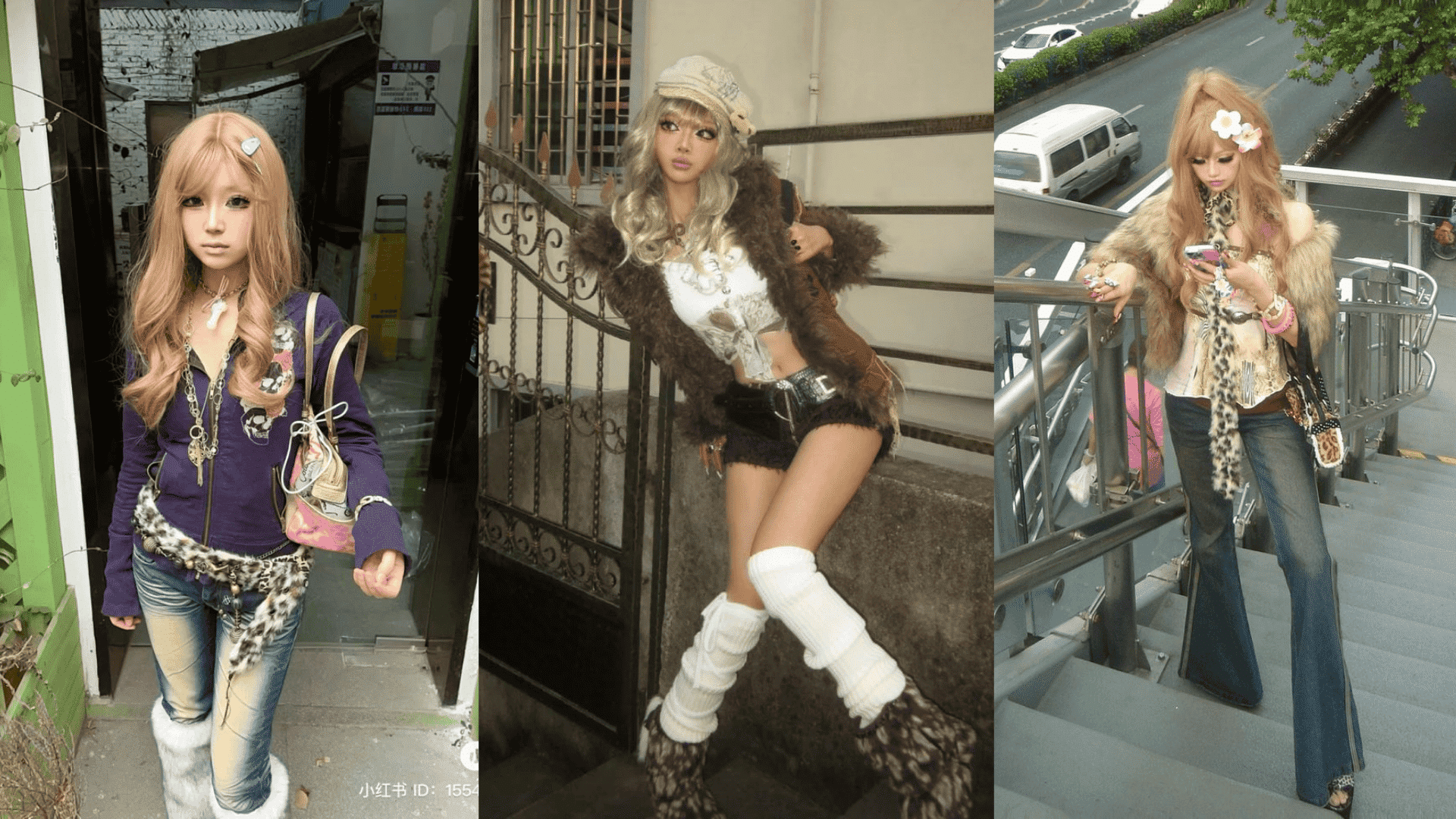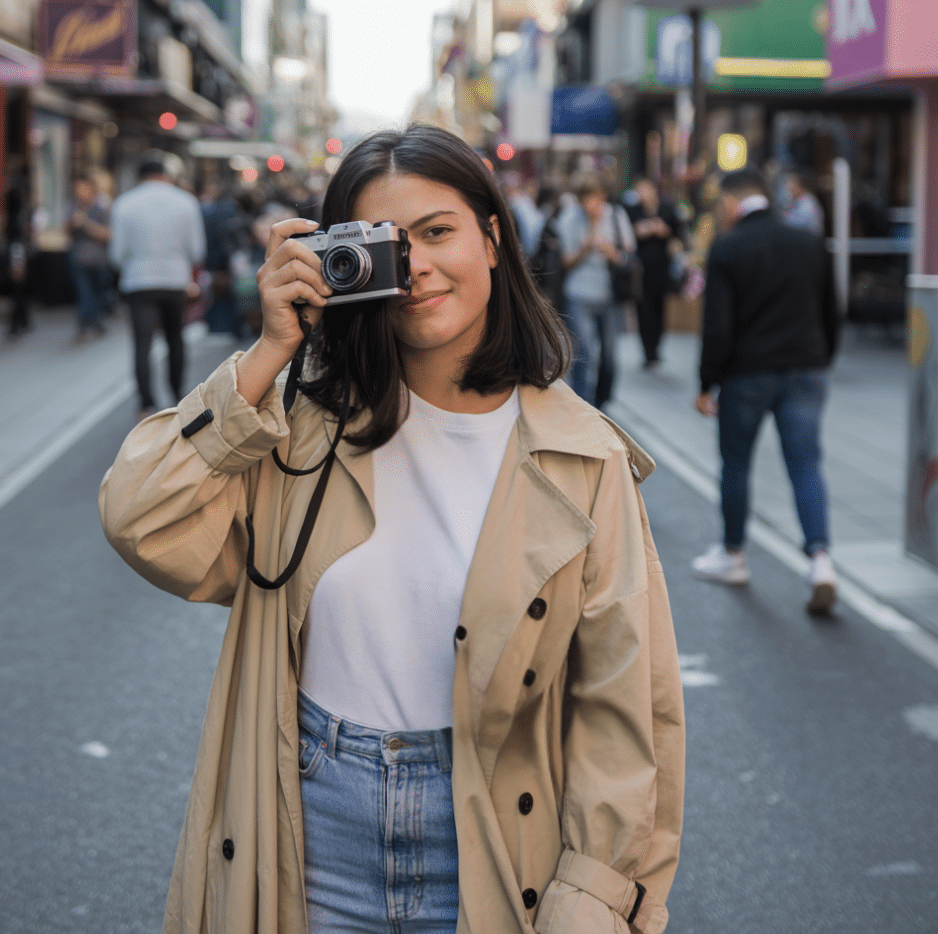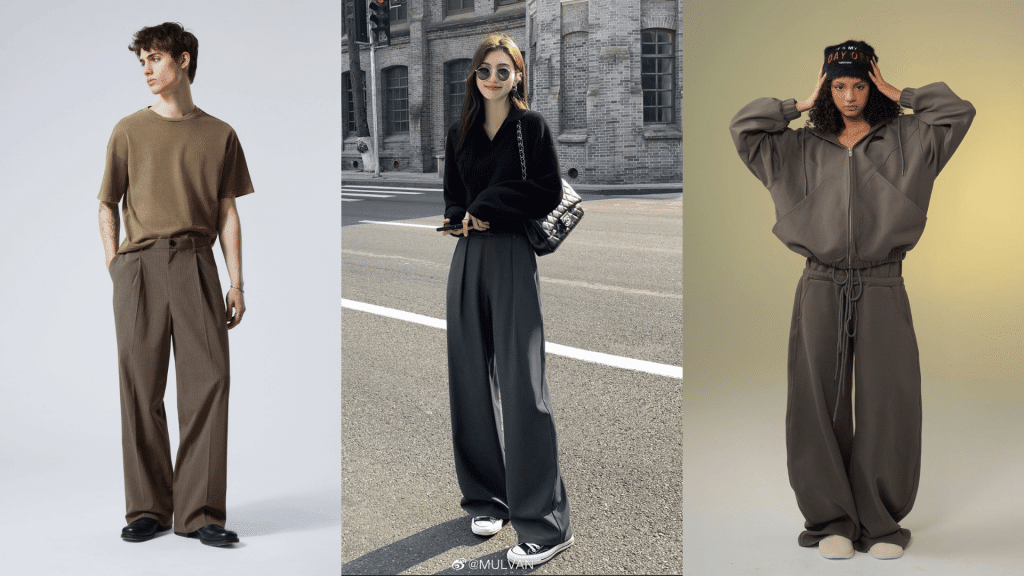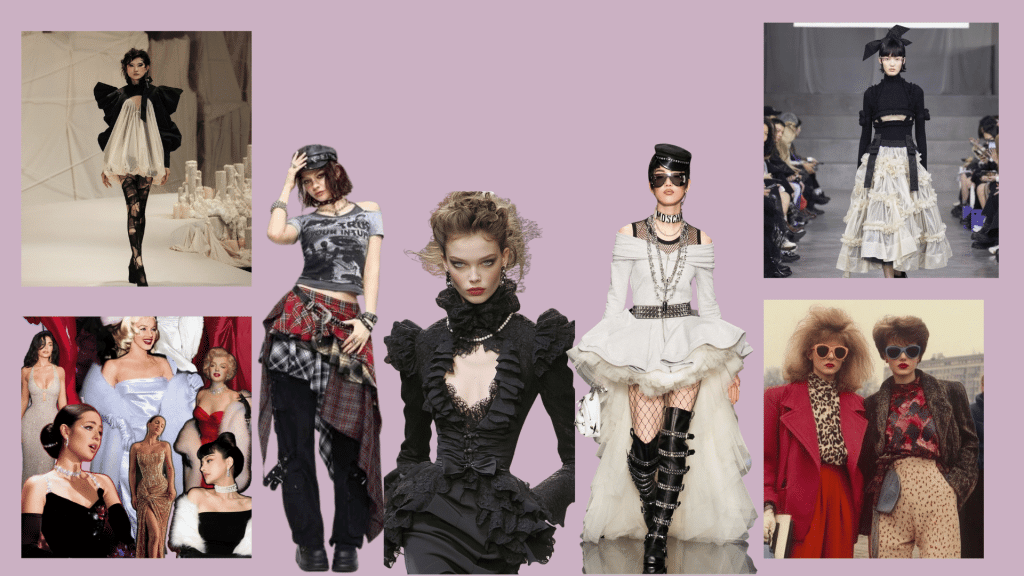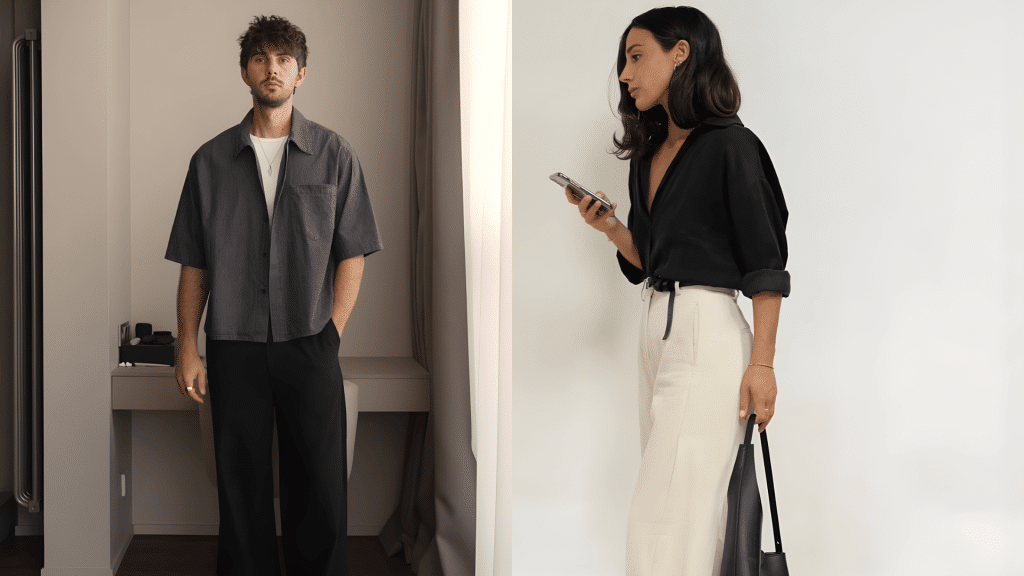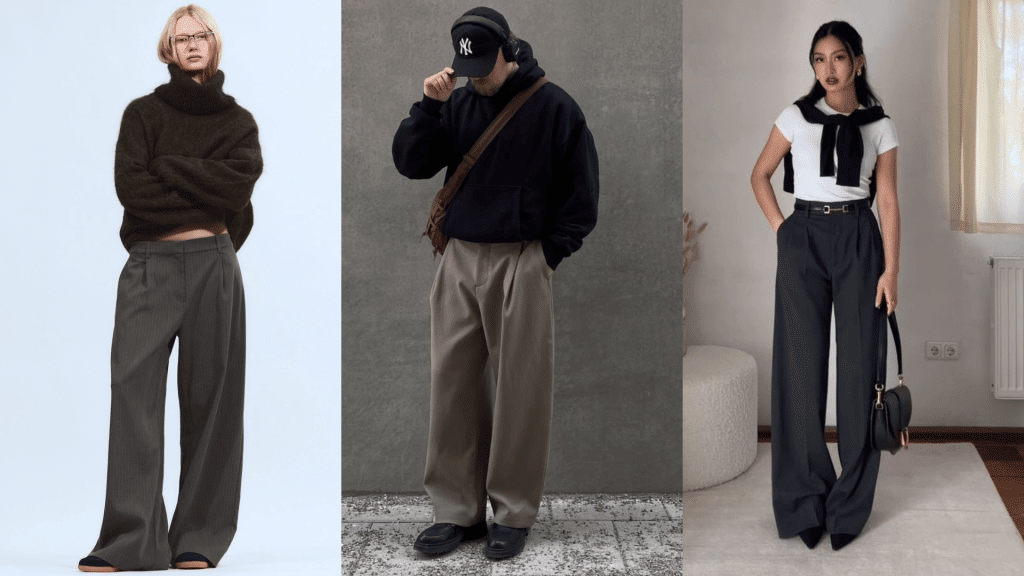What is gyaru style? Gyaru fashion represents one of Japan’s most intriguing cultural rebellions, a bold rejection of traditional beauty standards that altered young women into sun-kissed, blonde-haired icons of self-expression.
Born from 1970s youth culture and exploding in the ’90s, this lively subculture drew inspiration from California’s beach scene while challenging Japan’s conservative ideals of pale skin and modest dress.
More than just fashion, gyaru became a powerful statement of individuality, allowing participants to craft their own identity in a society that prized conformity.
For anyone thinking about what gyaru style is today, it remains a fearless approach to beauty and self-renewal that continues to inspire fashion enthusiasts worldwide.
Gyaru Meaning and Cultural Roots
The word “gyaru” comes from the English “gal,” adapted into Japanese as ギャル. This reflects the influence of Western culture and a departure from traditional norms.
What is gyaru style? It is a bold Japanese subculture that emerged during Japan’s post-war economic boom, challenging the traditional image of the yamato nadeshiko, characterized by pale skin, black hair, modest attire, and a quiet demeanor.
For those wondering what gyaru style was, it represented rebellion and self-expression that rejected traditional expectations.
This culture accepted female empowerment over demure behavior. It also influenced attitudes toward education, careers, and relationships, emphasizing personal freedom over societal norms of marriage and motherhood.
Gyaru Meaning in Japanese Context
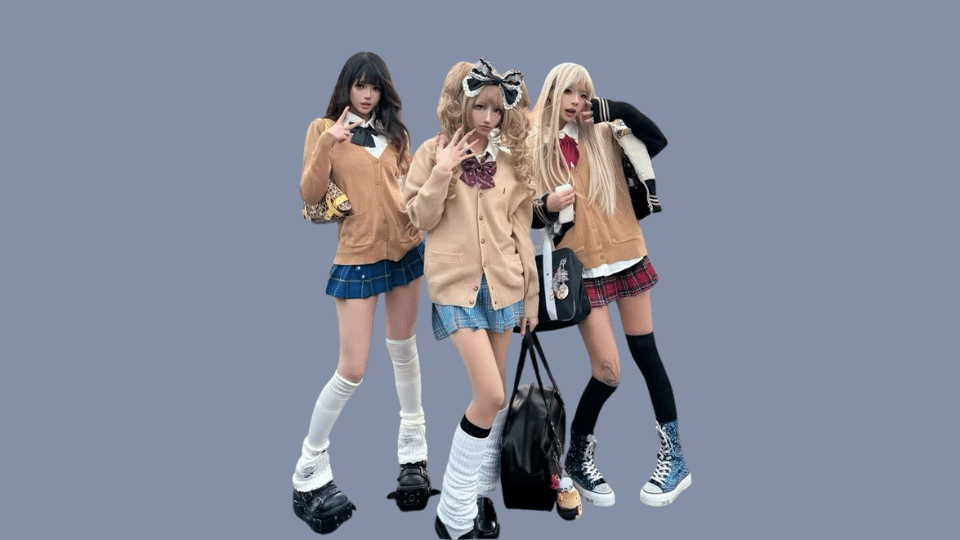
In Japan, gyaru refers to a striking youth subculture defined by bold fashion, dramatic makeup, and rebellious energy, symbolizing freedom from traditional beauty ideals.
Understanding what is gyaru style means recognizing this celebration of individuality that challenges conventional Japanese beauty standards.
Symbolism of rebellion and individuality
Gyaru symbolized youth rebellion against Japan’s strict hierarchy and conformity, where standing out was discouraged.
The shift from natural Japanese features to Western-inspired looks was a deliberate rejection of societal pressure to conform to traditional norms.
Every element, from deep tan to bleached hair, served as a form of cultural resistance, empowering young women to reclaim their appearance and identity.
Contrast with Traditional Japanese Beauty Ideals
Traditional Japanese beauty emphasized “clear white skin,” but gyaru practitioners darkened their complexion to an almost bronze tone for maximum contrast.
The traditional ideal of straight, dark hair was replaced with heavily bleached, curled, or teased styles that created a dramatic impact and required maintenance.
Where traditional femininity valued subtlety in makeup and behavior, gyaru makeup was characterized by bold drama, featuring heavy eye makeup, false eyelashes, and bright lips.
Substyles ofGyaru Fashion
Gyaru fashion represents a diverse spectrum of bold styles, each with a distinct identity, from glamorous to rebellious.
Understanding what is gyaru style means investigating these substyles that showcase the versatility and cultural impact of gyaru across different personalities.
1. Kogal: Schoolgirl-Inspired
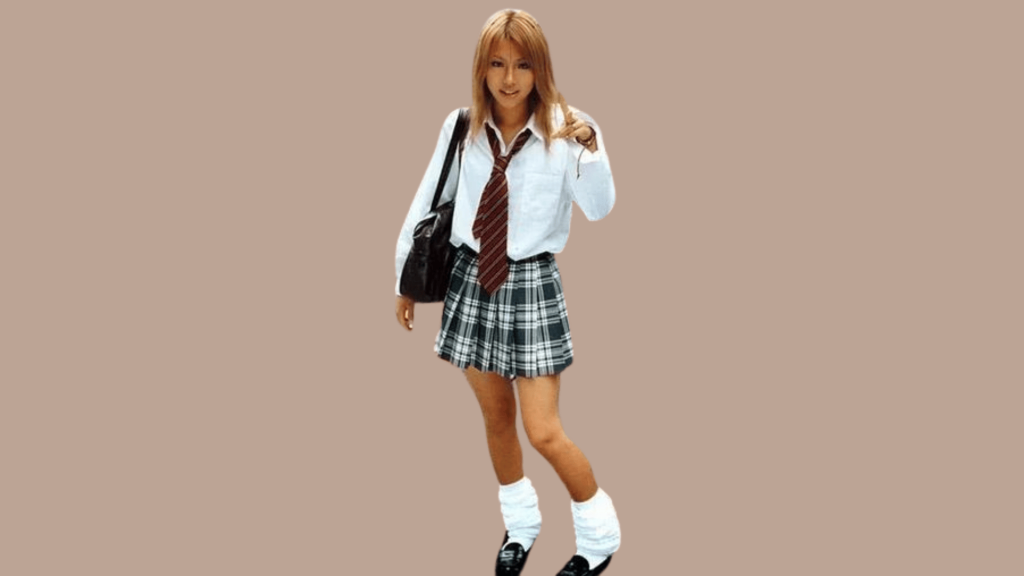
Source: Pinterest
Kogal emerged as one of the earliest and most recognizable gyaru substyles, combining traditional school uniform elements with rebellious modifications:
- Practitioners shortened their school skirts to mini length, dramatically altering the conservative silhouette of standard uniforms
- Loose socks were worn bunched around the ankles, creating a deliberately unkempt appearance that contrasted with neat uniform expectations
- Colorful hair clips, platform shoes, and other accessories were added to personalize the traditional school look
2. Hime Gyaru: Princess Aesthetic
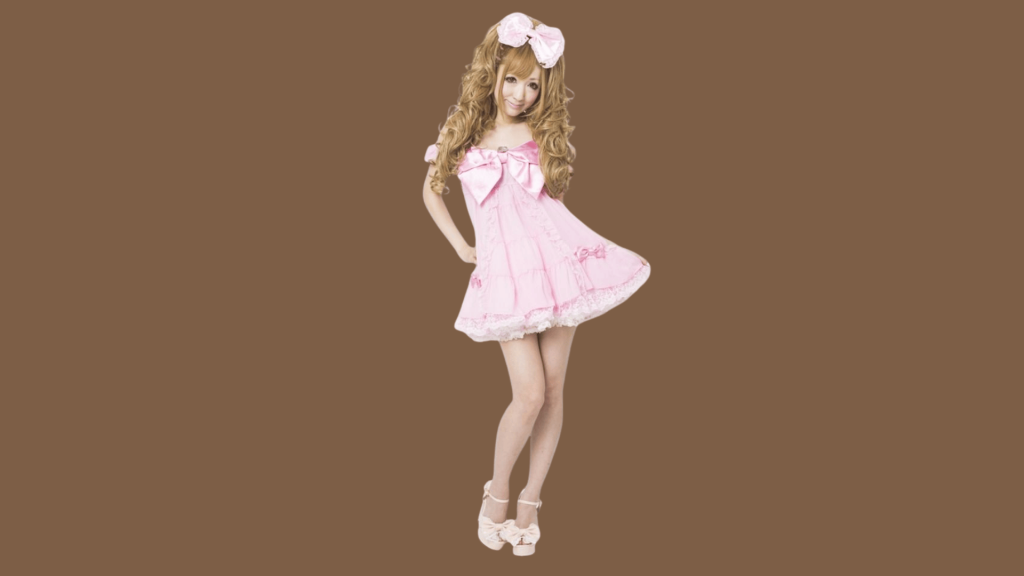
Source: Pinterest
Hime gyaru, meaning “princess gyaru,” represented the more refined and feminine side of the subculture:
- Emphasized luxurious, doll-like beauty with voluminous curled hair that created a, regal appearance
- Featured soft makeup in pink and white tones that contrasted softly with the gyaru’s signature tanned skin
- Incorporated outfits inspired by Rococo and Lolita fashion, blending historical European elegance with Japanese street style
- Practitioners wore brand-name clothing, excessive jewelry, and carried designer handbags to create an image of pampered royalty
3. Ganguro: Extreme Rebellious Style
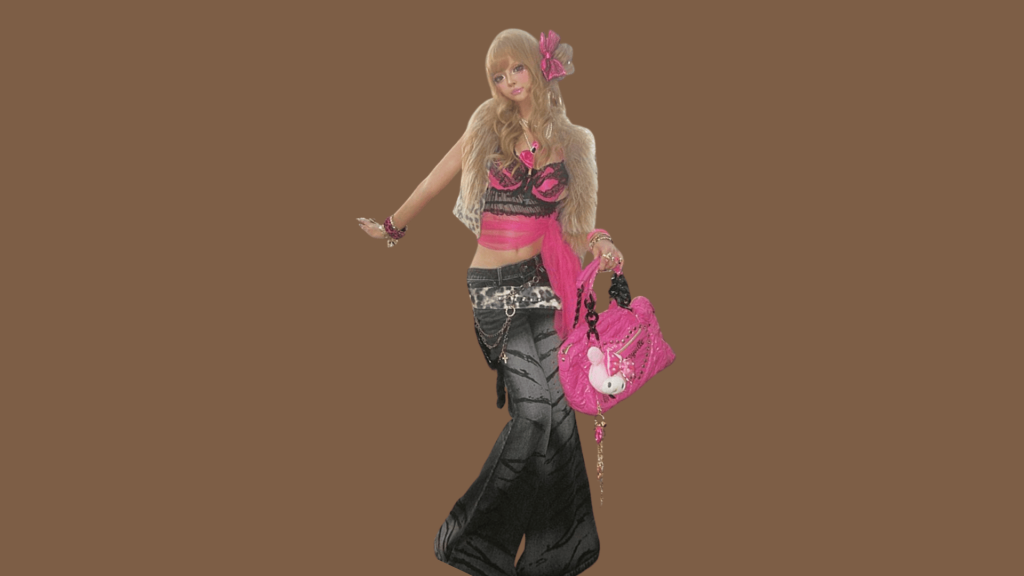
Source: Pinterest
Ganguro pushed gyaru vibe to its most radical extreme, representing the peak of rebellion against Japanese beauty standards:
- Featured deeply tanned or artificially darkened skin that contrasted dramatically with white or silver makeup applied around the eyes and lips
- Practitioners added colorful hair extensions in bright, unnatural shades that increased the dramatic visual impact
- Platform shoes could reach several inches in height, creating an imposing silhouette that commanded attention
- Neon accessories and clothing were incorporated to amplify the already striking appearance
4. Onee Gyaru: Mature, Elegant Look
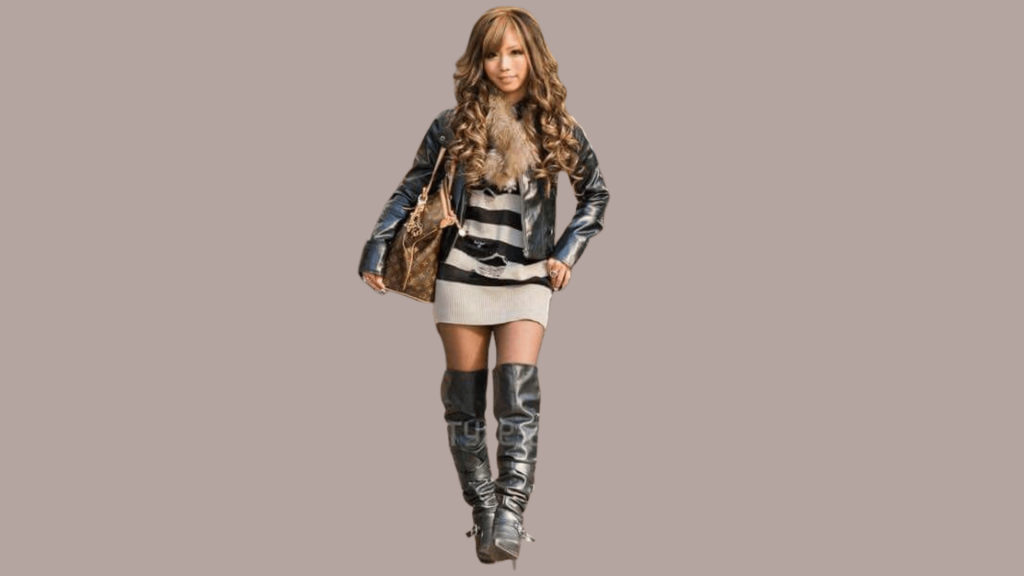
Source: Pinterest
Onee gyaru, meaning “older sister gyaru,” appealed to women in their twenties and thirties who wanted to maintain gyaru vibe while adopting a more mature appearance:
- Featured more subdued tanning that maintained the gyaru signature while appearing more workplace and socially acceptable
- Emphasized clothing choices that balanced boldness with maturity
- Utilized refined makeup techniques that showcased skill and experience rather than youthful rebellion
- Often incorporated designer fashion and professional styling to create a polished, upscale appearance
5. Manba/Yamanba Gyaru: Neon, Exaggerated, Colorful Rebellion
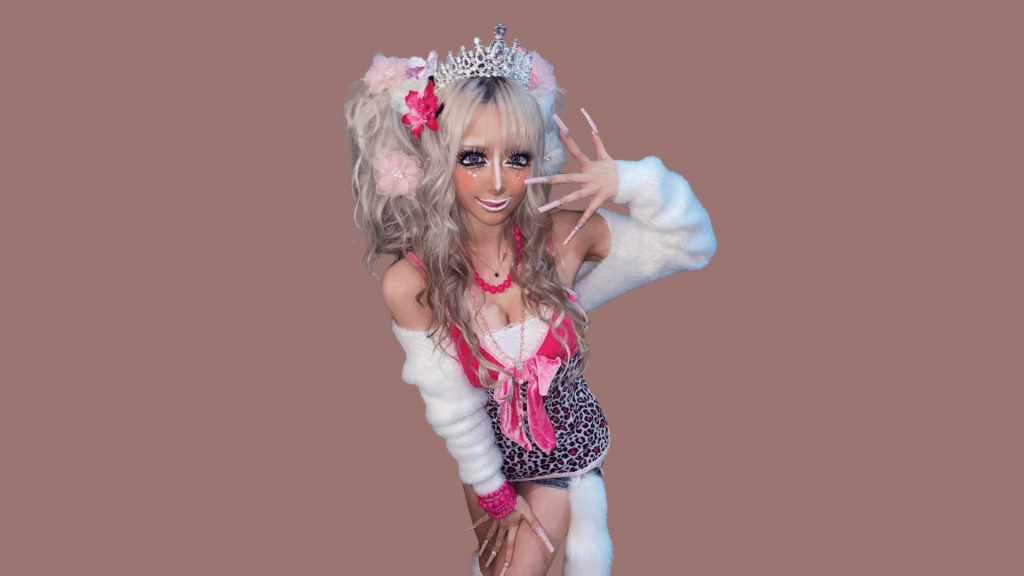
Source: Pinterest
Manba and Yamanba represented the most extreme and theatrical expressions of gyaru culture, showcasing complete artificiality and fantasy:
- Featured vibrant neon colors in bright pink, blue, or green eyeshadow that created an otherworldly appearance
- Practitioners applied white concealer around their eyes and lips, creating stark contrasts with their darkened skin
- Faces were often decorated with stickers, gems, or hand-drawn designs that changed makeup into wearable art
- The substyle accepts completely artificial and fantasy, rejecting any pretense of natural beauty
6. Agejo Gyaru: Glamorous, Hostess-Inspired Femininity
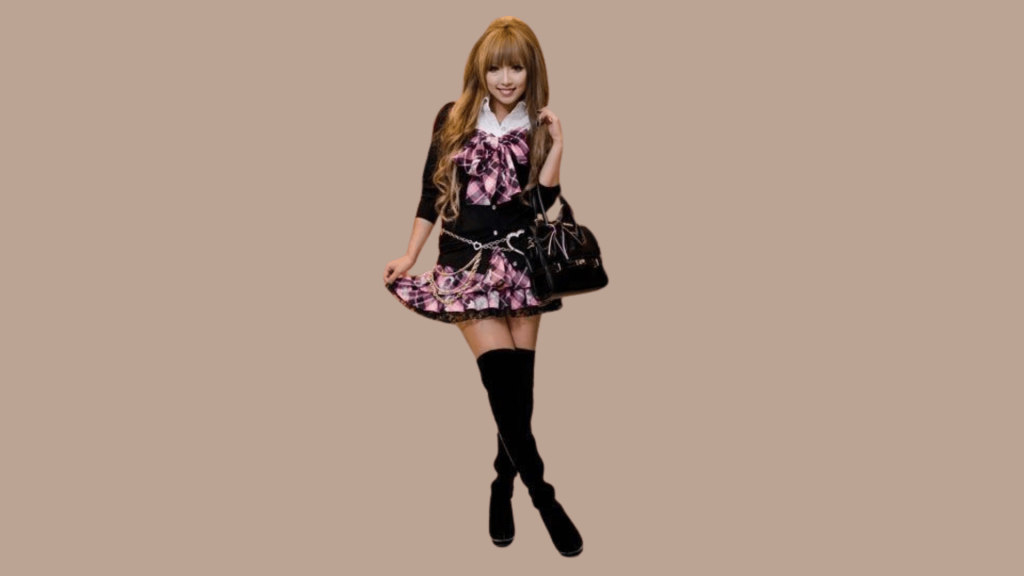
Source: Pinterest
Agejo gyaru drew inspiration from Japan’s hostess club culture, emphasizing ultra-feminine glamour and sexual appeal:
- Featured perfectly styled voluminous hair that required professional-level maintenance and styling expertise
- Showcased dramatic eye makeup with multiple sets of false eyelashes creating an intensely seductive appearance
- Emphasized form-fitting clothing that accentuated curves and highlighted feminine silhouettes
- The look was polished and expensive-looking, often incorporating luxury brands to convey high-end appeal
- Required meticulous attention to grooming details, representing aspirational femininity within the gyaru framework
Key Characteristics of Gyaru Fashion
Gyaru fashion makes a striking visual statement through exaggerated makeup, flashy clothing, and confident attitudes that directly challenge Japan’s traditional standards of modest appearance.
What is gyaru style essentially represents a youth movement where personal expression triumphs over societal expectations through bold visual choices.
1. Makeup and Hair
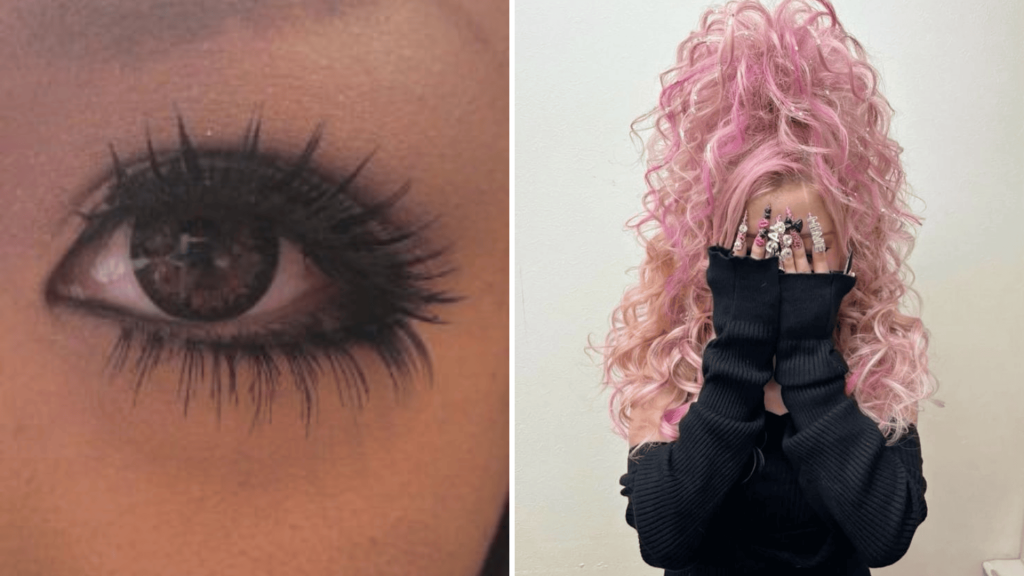
Dramatic Eyeliner, False Lashes, and Bronzed Skin
Gyaru makeup featured theatrical intensity with key signature elements:
- Heavily bronzed or tanned skin that defied Japanese beauty norms of a pale complexion
- Dramatic black eyeliner extending beyond natural eye shape for a doe-eyed effect
- Multiple layers of false eyelashes create an almost doll-like appearance
- Extensive contouring with neutral or glossy lips to balance the bold eye makeup
Bleached or Colorful, Elaborate Hairstyles
Hair transformation was central to gyaru identity:
- Natural dark hair bleached to various blonde shades, from honey to platinum
- Heavily teased and backcombed styles create maximum volume and height
- Hair extensions for added length and volume, often incorporating bright color streaks
- Gravity-defying constructions held with extensive hairspray and decorative accessories
2. Clothing and Accessories
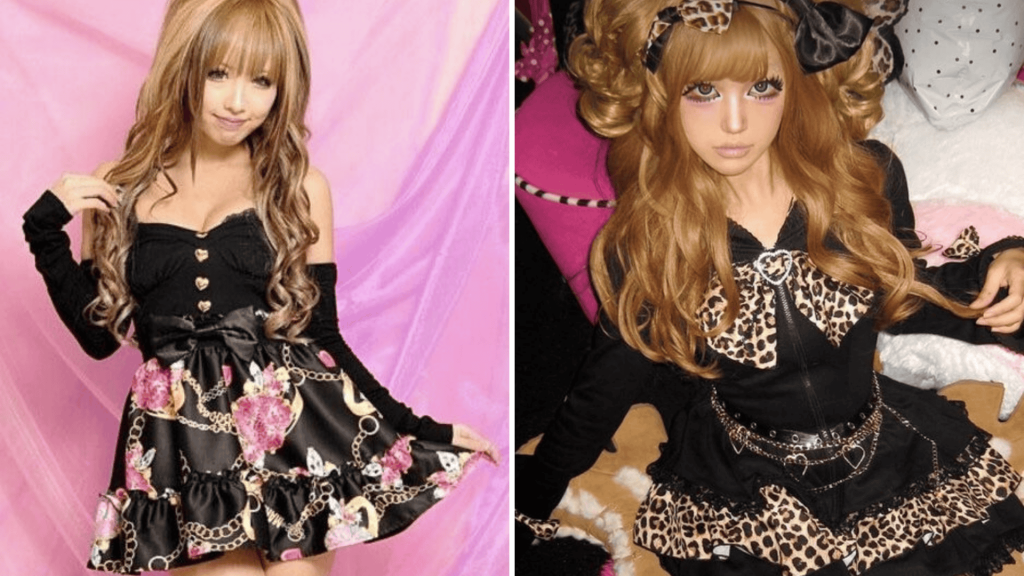
In gyaru style, clothing and accessories are tools of self-expression through bold outfits and flashy prints. Every detail reinforces individuality and challenges traditional Japanese beauty norms with confident rebellion.
Miniskirts, Bodycon Dresses, and Platform Heels
Gyaru fashion emphasized body-conscious silhouettes that celebrated feminine curves and challenged conservative dress codes. The clothing choices were deliberately provocative and designed to command attention in any setting.
- Extremely short miniskirts paired with thigh-high stockings or bare legs became the signature bottom wear
- Form-fitting bodycon dresses and crop tops that accentuated curves dominated evening and party wear
- Essential platform shoes ranging from modest two-inch platforms to extreme eight-inch heels that changed the posture and presence
- Footwear often featured bright colors, decorative elements like buckles and chains, or even LED lights for maximum visual impact
Statement Accessories and Bold Prints
The gyaru vibe relied heavily on layered accessories and eye-catching patterns, creating a maximalist approach to fashion. Every element was chosen to make a statement and reflect the wearer’s bold personality.
- Oversized jewelry, including chunky bangles and statement necklaces, mixed with cute character accessories like Hello Kitty items
- Designer handbags or convincing knockoffs featuring bold patterns, bright colors, and decorative charms that served as status symbols
- Clothing incorporated animal prints (particularly leopard and zebra), bright florals, polka dots, and graphic designs that demanded attention and refused to blend into the background
3. Lifestyle Elements
Tokyo’s Shibuya district served as the heart of the gyaru movement, where fashion and social identity merged. This area became a living showcase, centered around key locations that defined the community experience.
- The iconic 109 department store building housed specialized gyaru boutiques, making it a pilgrimage destination for practitioners nationwide
- Center Gai area made into a gathering place for socializing, street fashion photography, and displaying the latest trends
- “Tachiyomi” culture emerged in bookstores where groups would browse fashion magazines without purchasing, creating informal community spaces
- Group activities including purikura photo sessions, karaoke parties, and club hopping became essential bonding rituals
- Tight-knit community circles provided crucial support and validation for practitioners making unconventional life choices in a conformist society
The Cultural Significance of Gyaru
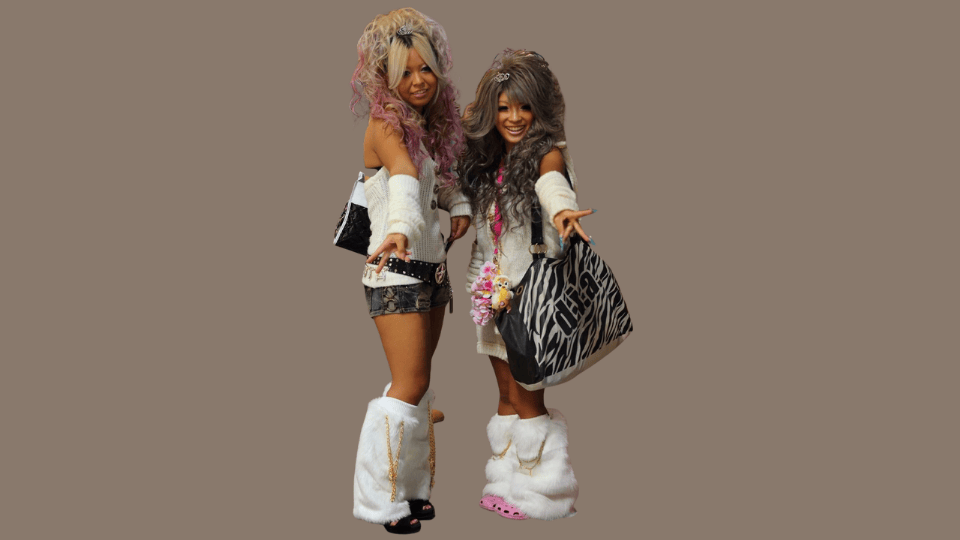
Gyaru is more than fashion; it’s a cultural statement that challenged Japan’s traditional femininity ideals and societal norms.
What is gyaru style represents how young women found their voice through bold beauty and self-expression, reshaping perceptions of identity and freedom.
Rebellion and Empowerment
Gyaru culture challenged Japan’s traditional modest femininity, ‘yamato nadeshiko,’ by rejecting demure behavior and conservative dress, instead embracing bold self-presentation and personal freedom.
- The movement opposed societal pressure for women to remain invisible and prioritize others’ comfort over their own desires.
- Financial independence became central, with many gyaru funding their lifestyle rather than relying on family support.
- The community validated women exploring non-traditional identities and lifestyles.
- Self-transformation through fashion and makeup became an empowering act of personal reinvention.
Influence on Global Fashion
Gyaru culture influenced international fashion with platform shoes crossing into Western streetwear. The dramatic eye makeup reshaped global beauty standards.
- K-pop idols incorporated modified gyaru elements, such as bold eye makeup and platform shoes, into their styling.
- Western influencers embraced gyaru-inspired looks, popularized through social media.
- The recent Y2K fashion revival draws heavily from the gyaru vibe, with brands reintroducing platform shoes, metallic fabrics, and fitted silhouettes.
- Beauty trends featuring dramatic contouring and false eyelashes reflect gyaru makeup techniques.
Conclusion
Gyaru style represents more than fashion; it’s a cultural revolution that challenged Japan’s traditional social norms.
What is gyaru style shows how dramatic makeup, bleached hair, and bold fashion transformed young women into architects of their own identities.
From kogal to ganguro styles, gyaru showed rebellion. Today, gyaru influences global fashion with platform shoes, bold makeup, and beauty debates. It proved fashion can be liberation, with true style coming from courage to be oneself.
Express your individual style and accept the bold confidence that defines true gyaru spirit.

